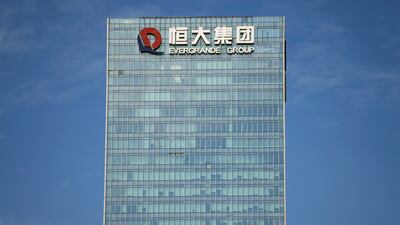China Evergrande Group’s long-awaited debt restructuring may finally be at hand, posing a fresh test for Xi Jinping’s government as it tries to rein in the country’s financial excesses without derailing economic growth.
The embattled developer said in an exchange filing late on Friday that it plans to “actively engage” with offshore creditors on a restructuring plan, offering its most explicit acknowledgement yet that its $300 billion of overseas and local liabilities have become unsustainable. The stock plunged 20 per cent Monday to a record low.
A barrage of statements from Chinese regulators — several of which landed just minutes after Evergrande’s announcement — suggested authorities are striving to contain the fallout on homeowners, the financial system and the broader economy, rather than orchestrate a bailout.
The government of Guangdong, the southern province where Evergrande is based, summoned founder Hui Ka Yan to express concern over the company’s announcement and said it would dispatch a team to the developer to ensure “normal” operations. The People’s Bank of China blamed Evergrande’s problems on the company’s “own poor management” and “reckless expansion.”
The flurry of activity follows several weeks of relative calm for Evergrande, which has been making last-minute payments on its dollar notes since late October at the urging of Beijing. Friday’s statements signal the world’s most indebted developer may struggle to make further payments within their grace periods, even after a spate of personal asset sales by Mr Hui that appeared designed to help Evergrande meet its near-term debt obligations.
Evergrande shares plunged to HK$1.81 in Hong Kong, bringing its decline on the year to 88 per cent. Its 8.25 per cent dollar bond due March 2022 is poised for its biggest fall on record, down 10.4 cents on the dollar to 23.2 cents.
The property services provider and new-energy vehicle start-up in which the developer holds the biggest stakes were down 5.2 per cent and 7 per cent respectively.
The company’s next test comes later on Monday when a 30-day grace period ends on two dollar bond interest payments that were initially due on November 6: a $41.9 million coupon for a note maturing in 2022 and $40.6m of interest on a security due the following year. Both bonds were issued by unit Scenery Journey Ltd.
The question for global markets is whether Beijing can co-ordinate a restructuring without upending the broader real estate sector, which accounts for nearly a quarter of its economic output.
One risk is that Beijing may not have a full picture of how indebted Evergrande and its peers have become. The Shenzhen-based developer indicated in its exchange filing on Friday that it may not be able to fulfil its pledge to guarantee payment on a $260m note issued by joint venture Jumbo Fortune Enterprises, an obligation that many Evergrande investors did not even know existed until a few months ago.
While it will be important to monitor how Evergrande’s restructuring progresses, the odds of renewed panic in Chinese credit markets are low, according to analysts at China International Capital, one of the nation’s largest investment banks. Real estate companies with poor management and high financial risks will be “phased out,” but authorities are likely to ensure that higher-quality developers retain access to funding, CICC analysts Yan Xu and Eric Yu Zhang wrote in a report.
China is likely to ease restrictions on the real estate sector this month and into the first quarter of 2022, according to analysts at Jefferies Financial Group. Regulators on Friday signalled that they would expand mortgage support beyond first-time homebuyers, guide banks to provide loans to developers for acquisitions, and further open funding channels including the asset-backed securities market, the analysts wrote. A reduction in banks’ reserve requirements is likely in the next few weeks after Premier Li Keqiang said on Friday a cut would come at the “proper time,” the analysts wrote.
Bond investors have been anticipating an Evergrande restructuring for months, with the company’s 2025 dollar notes trading below 30 cents since the end of September. Chinese high-yield dollar bonds rose by as much as 1 cent on the dollar on Monday, as expectations the central bank may cut the required reserve ratio for lenders offset concerns about Evergrande’s potential debt restructuring, according to credit traders.
Investors are increasingly differentiating between the weakest and strongest borrowers after China’s government took steps to mitigate the cash crunch for higher-rated developers in recent weeks. Apart from Evergrande, money managers are bracing for a potential default by Kaisa Group Holdings, which faces a $400m bond maturity on Tuesday after failing to swap the notes for new ones due 18 months later. Smaller Chinese developer Sunshine 100 China Holdings defaulted on $179m of debt and interest payments due on Sunday.
For Evergrande, the next step may be to enter into an informal debt standstill as it continues to try to negotiate with creditors, according to Bloomberg Intelligence analyst Daniel Fan.
“Extension of maturities, based on sustainability of debt, would be likely,” he said. “One option to sweeten the process is to link some of the repayment to its offshore assets,” such as its Hong Kong-listed electric vehicle unit, Mr Fan added.
Evergrande’s offshore creditors are widely expected to fall near the bottom of the priority list in a restructuring, behind nearly 1.6 million homeowners who gave the developer down payments on properties, local suppliers, Evergrande employees, and individual investors who bought wealth management and trust products tied to the company.
Several Evergrande-linked Wealth Management Products (WMPs) and trusts have already defaulted, restructured or fallen behind on payments.

